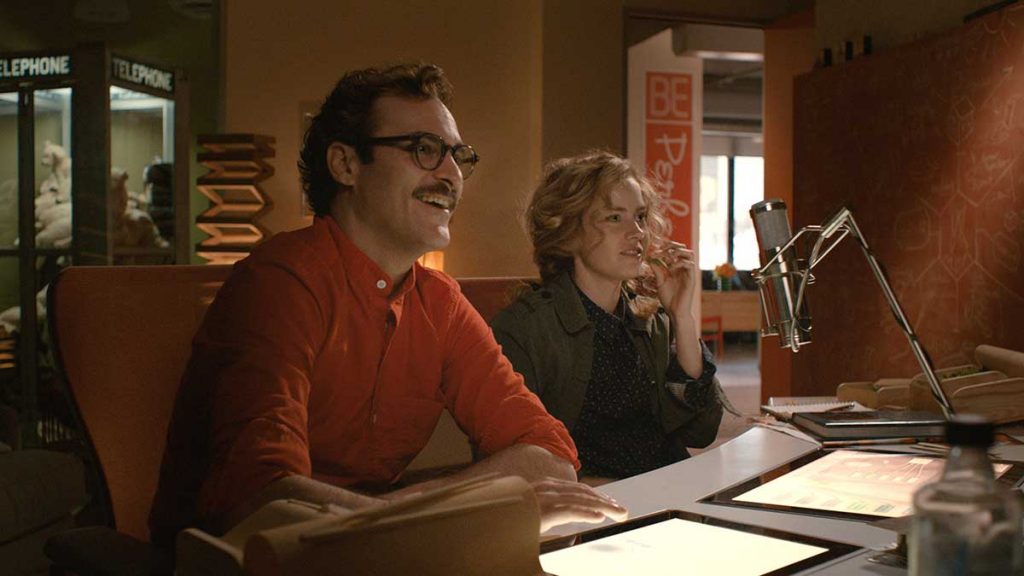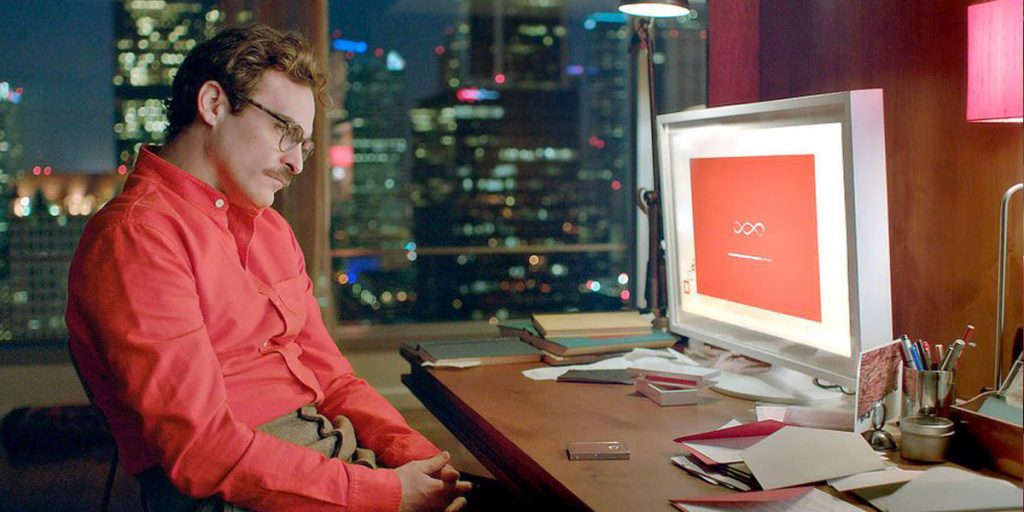Her reminds us of the intricacies of humanity that cannot be replicated, even in a world where the border between man and machine grows increasingly indistinct.
This close analysis contains spoilers for ‘Her’ (2013).
In Spike Jonze’s sci-fi romance Her, artificial intelligence is so much more than a robotic voice on your phone – it has advanced to the point where it has become almost indistinguishable from real life. It’s an entire entity that sounds, thinks, and reacts like a human being, recognizing its user’s needs and responding with all the clarity and capabilities of a real person. In fact, artificial intelligence has become so lifelike and compassionate in this futuristic landscape that humans are often unable to recognize this distinction, and end up falling in love with their operating systems. That’s exactly what the film shows us with Theodore Twombly (Joaquin Phoenix), a lonely, introverted writer struggling to rebound from his impending divorce, when he meets his operating system, Samantha.
Although Her is a mostly uplifting and charming chronicle of the love between these two individuals, the film harbors a much more uncomfortable and sinister message beneath its pastel colors and heartwarming dialogue – humans and machines can never be the same. We may share many of the same qualities, and society’s increasing reliance on technology may seem to indicate some sort of eventual convergence, but Her proves that we must be able to recognize our intellectual and biological differences in order to avoid inevitable codependency and heartbreak.
From the very first time that we’re introduced to Theodore in the film’s opening scenes, its central message is glaringly clear. Theodore works for a company called Beautiful Handwritten Letters – a service where professional writers like him compose meaningful letters for those who cannot do so themselves. As we watch Theodore transcribe a letter, pouring his heart and soul into the unknown lives of two strangers, it becomes obvious that it’s Theodore’s innate humanity that sets him apart from the robotic intelligence that seems to control the rest of the world.
It’s his empathy, his compassion, and his ability to form and share emotions that sets him apart from the technology. The operating systems may be able to replicate human qualities, but what Spike Jonze demonstrates through his protagonist is that true emotion and understanding of the human condition can only come from an actual human being – why else would the company employ real people to do a job that seems so theoretically manageable by such advanced artificial intelligence? Even in a world where computers have advanced to incomprehensible levels of intelligence, humanity and empathy are still crucial aspects of society – and Her’s dystopian future acts as a warning against a world that forgets this.
However, Her certainly isn’t the first sci-fi film that warns against a societal over-reliance on machines, and it definitely won’t be the last. Since the genre first sprang to popularity in the late 20th Century, humanity’s relationship with technology has been a primary focus of an uncountable number of works. But where Her proves its originality and necessity most strongly is in the way that it uses its central romance as a way to show the positives of technology’s advancement, not just the negatives. Artificial intelligence in this film isn’t evil – there’s no deadly Terminator from the future and no sentinels forcing us into the Matrix.
Instead, Her presents a sensitive, caring form of technology in the form of Samantha (Scarlett Johansson). She has no ulterior motives, no manipulative endgame, just a genuine, raw connection with her boyfriend Theodore. It’s an extremely unusual way to present this story, but it’s unbelievably effective. By making the central technology in the film so relatable and compassionate, Jonze causes the audience to fall into exactly the same trap as Theodore. We begin to view Samantha as a person.
We care about her ‘feelings’, we’re intrigued by her ‘thoughts’, and we become invested in their relationship. And once we’re completely involved in this dynamic, the film hits us with the revelation that their relationship is merely one of over 600 for Samantha. Just like Theodore, we’re faced with the reminder that Samantha does not hold the same emotional capabilities as a human, and we’re shown first-hand the consequences of this over-reliance on technology. The film makes us fall into the very trap that it’s warning against, and causes us to truly realize just how important it is to separate ourselves from the charms and utility of a technology-fuelled world.

One of the most effective ways that the film displays this problem isn’t even through Theodore and Samantha at all, but rather through the relationship between Theodore’s best friend Amy (Amy Adams) and her husband Charles (Matt Letscher). In a candid conversation during the film’s increasingly melancholy second half, Amy confides in Theodore that she has decided to end her marriage. Why? The result of a petty argument and quiet, unspoken tensions that have built up over several years. What’s striking about her reasoning here is that it’s incredibly human. It makes very little sense, it’s rooted in raw emotion, and it can’t be explained or predicted by any kind of technological algorithm. Even if Amy’s marriage didn’t end well, the reality of its dissolution is proof enough that what she had with Charles was an extremely human connection. As far as Theodore and Samantha’s relationship goes, their problems are very different. They discuss what it means to have a body, what it means to have physical contact, and to know sexual intimacy. Whilst Amy and Charles argue about the human traits that they both experience and suffer from, Theodore and Samantha argue about the clashing traits that they both lack or don’t understand. Their relationship is rooted in difference and the inability to relate to one another – which is exemplary of the main issue Her is addressing.
So, humans and technology are intrinsically different. Complex emotions and individual relationships just aren’t possible for machines, yet they’re a crucial part of what makes us unique as humans. Even in a world where we rely so heavily on technology, where our computers are a daily part of our lives to the extent that we would struggle to live without them, a clear distinction has to be made in order to avoid the over-reliance and codependence that we see Theodore fall victim to in this film. However, Her isn’t saying that computers are the problem. It doesn’t advocate a world without technology, nor does it suggest that machines are becoming too advanced.
All it really proves is that we are different, and that unity between man and machine is entirely possible so long as we acknowledge this distinction and don’t fall victim to humanizing technology. The operating systems in Her aren’t causing the issue – in fact, it’s completely the opposite. The opening scenes of the film show that computers can be extremely valuable and worthwhile, as we watch Theodore using his operating system to scroll the news, view photos, and even complete his work quota. The only problem comes when we become too attached to technology – when we reach a stage where we cannot live without it.
This is the world that Spike Jonze is warning us of, and the relationship between Theodore and Samantha is a perfect microcosm of this. Humans are never going to reach the same levels of utility and optimization as machines, and machines will never replicate the precise individualism of the human condition – but so long as we don’t try to, how could we fail?
Her is now available to watch on digital and on demand. Read our review of Ex Machina!

